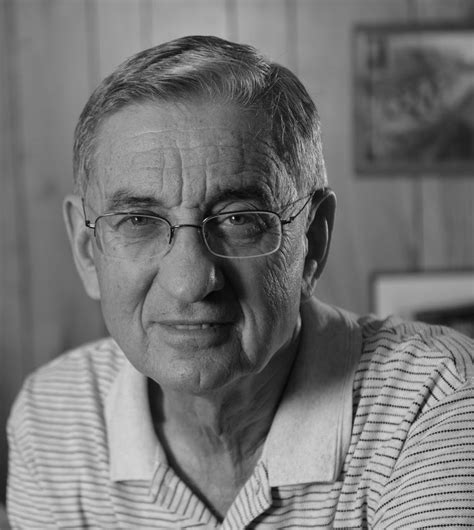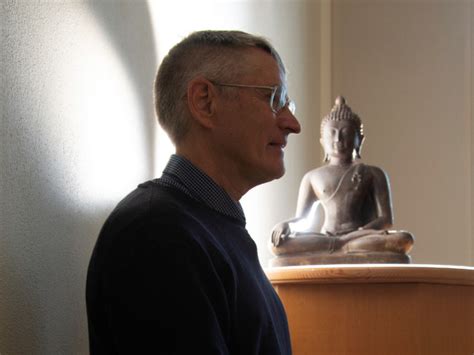A Quote by Elizabeth Bowen
Ghosts, we hope, may be always with us - that is, never too far out of the reach of fancy. On the whole, it would seem they adapt themselves well, perhaps better than we do, to changing world conditions - they enlarge their domain, shift their hold on our nerves, and, dispossessed of one habitat, set up house in another. The universal battiness of our century looks like providing them with a propitious climate.
Related Quotes
Adversity is a severe instructor, set over us by one who knows us better than we do ourselves, as he loves us better too. He that wrestles with us strengthens our nerves and sharpens our skill. Our antagonist is our helper. This conflict with difficulty makes us acquainted with our object, and compels us to consider it in all its relations. It will not suffer us to be superficial.
My grandmother told me once that when you lose somebody you think you've lost the whole world as well, but that's not the way things turn out in the end. Eventually, you pick yourself up and look out the window, and once you do you see everything that was there before the world ended is out there still. There are the same apple trees and the same songbirds, and over our heads, the very same sky that shines like heaven, so far above us we can never hope to reach such heights.
What we would like to do is change the world - make it a little simpler for people to feed, clothe, and shelter themselves as God intended for them to do....We can, to a certain extent, change the world; we can work for the oasis, the little cell of joy and peace in a harried world. We can throw our pebble in the pond and be confident that its ever widening circle will reach around the world. We repeat, there is nothing that we can do but love, and, dear God, please enlarge our hearts to love each other, to love our neighbor, to love our enemy as well as our friend.
Perhaps there's another, much larger story behind the printed one, a story that changes just as our own world does. And the letters on the page tell us only as much as we'd see peering through a keyhole. Perhaps the story in the book is just the lid on a pan: It always stays the same, but underneath there's a whole world that goes on - developing and changing like our own world.
We live, understandably enough, with the sense of urgency; our clock, like Baudelaire's, has had the hands removed and bears the legend, "It is later than you think." But with us it is always a little too late for mind, yet never too late for honest stupidity; always a little too late for understanding, never too late for righteous, bewildered wrath; always too late for thought, never too late for naïve moralizing. We seem to like to condemn our finest but not our worst qualities by pitting them against the exigency of time.
What Habitat does is much more than just sheltering people. It’s what it does for people on the inside. It’s that intangible quality of hope. Many people without decent housing consider themselves life’s losers. This is the first victory they may have ever had. And it changes them. We see Habitat homeowners go back to school and get their GEDs, enter college, do all kinds of things they never believed they could do before they moved into their house. By their own initiative, through their own pride and hope, they change.
Hopelessness may be the saddest word in our language. Despair is the enemy of our souls. It can paralyze us, halt our progress, and cause us to lose our way. But hope awakens us like a light shining in the darkness. We can endure all things when our hope is centered in one who will never fail us-our Savior, Jesus Christ, who is the light of the world.
Don't be overwhelmed by a man's fancy car, fancy house or fancy clothes. It's really the person inside the care, house and clothes that matters. By the same token, don't be underwhelmed by a less-than-fancy car, house or clohtes. Women can earn the car and house themselves, and you can always buy your man nice clothes, too.
However we may flatter ourselves to the contrary, our friends think no higher of us than the world do. They see us through the jaundiced or distrustful eyes of others. They may know better, but their feelings are governed by popular prejudice. Nay, they are more shy of us (when under a cloud) than even strangers; for we involve them in a common disgrace, or compel them to embroil themselves in continual quarrels and disputes in our defense.
Many of our actions degrade our habitat because we undertake them in order to reach goals whose allure blinds us to myriad dire consequences. In order to fuel our complex civilizations, we are lacing our planet's atmosphere with carbon dioxide, a greenhouse gas that, if it has not already begun doing so, will soon warm the Ice Age climate to which we owe our very existence.
Repetition and ritual and their good results come in many forms: changing the oil filter, wiping noses, going to meetings, picking up around the house, washing dishes, checking the dipstick . . . such a round of chores is not a set of difficulties we hope to escape from so that we may do our practice, which will put us on the path. It is our path.
No one can travel so far that he does not make some progess each day. So let us never give up. Then we shall move forward daily in the Lord's way. And let us never despair because of our limited success. Even though it is so much less than we would like, our labour is not wasted when today is better than yesterday!
We have simply arrived too late in the history of the universe to see this primordial simplicity easily... But although the symmetries are hidden from us, we can sense that they are latent in nature, governing everything about us. That's the most exciting idea I know: that nature is much simpler than it looks. Nothing makes me more hopeful that our generation of human beings may actually hold the key to the universe in our hands - that perhaps in our lifetimes we may be able to tell why all of what we see in this immense universe of galaxies and particles is logically inevitable.
To find this greater truth about God, Spirit, and the sacred, we must often set aside the limiting impressions from our childhood. In many instances these images of fear only serve to hold us back in our search for authentic spirituality...Open up your mind and heart to a concept of Spirit who looks out for us, loves us, sheds light on our path, and wants nothing less for us than unconditional happiness.
If one looks at all closely at the middle of our own century, the events that occupy us, our customs, our achievements and even our topics of conversation, it is difficult not to see that a very remarkable change in several respects has come into our ideas; a change which, by its rapidity, seems to us to foreshadow another still greater. Time alone will tell the aim, the nature and limits of this revolution, whose inconveniences and advantages our posterity will recognize better than we can.







































